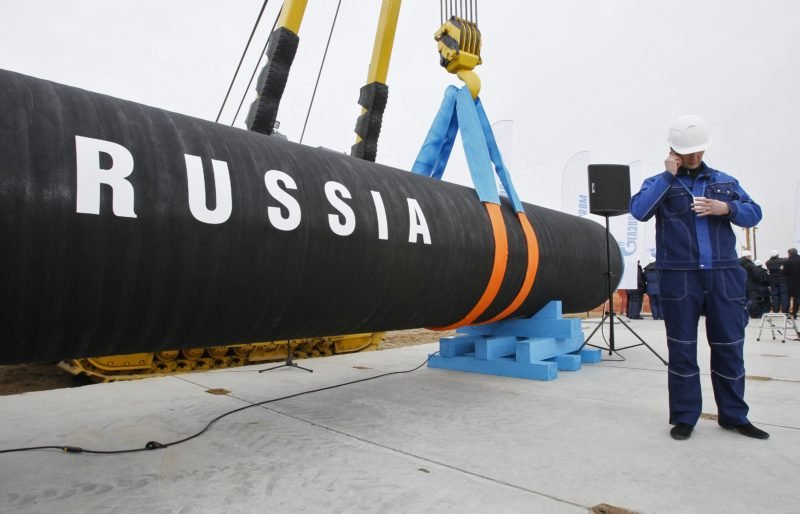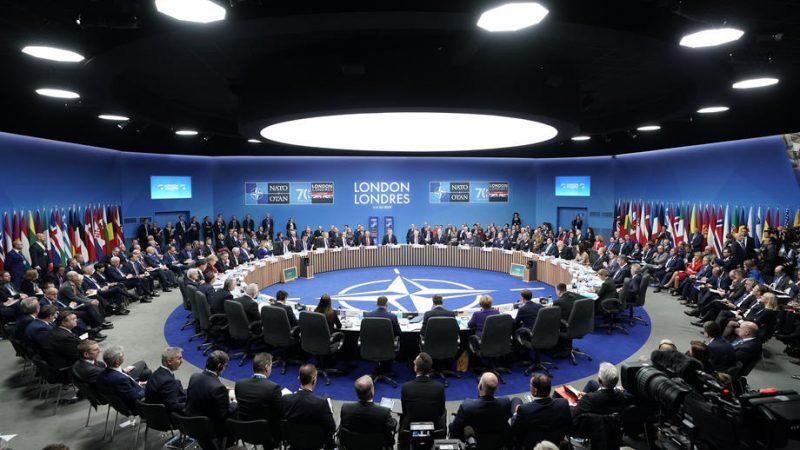Putin’s energies: Which oil and gas projects might push geopolitical confrontation in Eurasia?

The West does not like the energy policy of Russia. And Putin, as its ideologist. “Aggressive,” “annexing,” “Russian-style” – labels like these are in spades. But the market should not really bother about “political colours and shades,” as profit always comes first. In theory, this is exactly how it should be. In reality, for decades we have been watching energy wars being waged, putting politics above the economy and hampering its development. Although, speaking objectively, Russia’s energy resources remain the best offer to go for on the European energy market. That the economic competitiveness of any country, including European, depends on the cost of energy is clear to everyone. The question is, how relevant resource wars really are in a rapidly changing world when humanity is moving up to a new technological level?
Supporters of the ideas of solidarity on both sides of the Atlantic may object: “Geopolitics is more important than the economy; Moscow is an aggressor…” A few years ago, they would have been right, to some extent: Russia’s policies have not always been akin to those of the European Union, but Donald Trump, the current and—apparently—prospective president of the United States, has also adopted the policy of protectionism, starting trade wars with both Europe and China. While the confrontation with Beijing can be defined as geopolitical, it is not clear what kind of civilizational differences could have arisen within NATO. Turkey does not count, of course.

So, the economy turns out to be more important after all. While Washington is striving to enter a new technological cycle, Europe finds itself in the thrall to the US geopolitics.
Europe itself lacks unity: Germany, France and Italy are searching for ways to mend relations with Russia, at least in the economic field (there is progress in some areas, while projects stall in others). At the same time, Poland’s leadership say that liquefied gas from the United States will cost 20–30 percent less than Russian gas shipped through pipelines.[1] Is that even possible, especially given Poland’s geographic proximity to Russia and the availability of well-developed energy infrastructures? It is only possible, if the United States subsidizes LNG supplies. That is another example where geopolitics prevails over the economy. But isn’t it a Pyrrhic victory? It depends on the will of the Old World nations. The United States is clearly not going to subsidize LNG supplies to Germany and France. Funds must flow—but in a totally different direction.
On the other hand, Moscow has never stopped pursuing an active energy policy. However, as the successor to the Soviet Union, Russia has inherited a gas transportation system oriented almost solely to Europe, one that by the early 2000s was not in line with the country’s new ambitions in a new geopolitical environment.
Incessant gas wars with Ukraine repeatedly proved the simple fact that the infrastructure failed to provide the sufficient diversification level. Russia therefore opted for developing an extensive network of new gas transportation routes, such as Blue Stream, Nord Stream, Power of Siberia, and other projects. All of these built on one and the same idea that there should be no transit countries that could potentially interfere with Russian gas supplies. The idea was apparently generated by Vladimir Putin, since he became its main implementer and proponent.

This was the conclusion drawn by the authoritative American agency Bloomberg in late 2019.[2] But in line with the simplified formula, so popular with the Americans, the emphasis was placed on the idea that the Kremlin was using its energy sources to pursue its “aggressive and expansionist policy.” Yet, there is a reason to believe that American media outlets use this rhetoric only in order to create a most convenient intellectual atmosphere in Europe to favour US energy companies.
Czech journalists offer a slightly more objective picture of Russian energy projects. Like the Americans, they assume that Russia uses energy cooperation as leverage to put pressure on its partners. But the Czechs can “understand” the logic of the Kremlin’s energy geopolitics and its desire to safeguard its supplies against belligerently anti-Russian Poland and Ukraine.[3] Prague, which is far from being the world’s Russophile capital, believes that Moscow distinguishes between NATO and the EU in its political understanding. While considering the former to be a direct threat (suffice it to mention the Alliance’s officials’ statements), Russia sees the latter as a strategic partner for diverse cooperation.
It should be noted that for quite a long time now, the US has been hampering, with various degrees of success, the implementation of Russian energy projects on the continent. Berlin has withstood the blow from Washington in the Baltics and hasn’t given up on Nord Stream 2: even the suspension of the 93 percent complete project in late 2019 due to the US sanctions did not sway the Germans’ political determination to see it through to the logical completion.[4] There is, however, an opposite example: at the end of 2014, the pressure exerted on Bulgaria yielded tangible results. Sofia suddenly abandoned the South Stream project, which was a heavy blow for the Russians at the time, since several billion euros had already been invested in the development of infrastructures in the south of Russia, necessary for the gas pipeline. In 2015, Turkey expressed interest in the energy project, prompting the transformation of South Stream into Turkish Stream.
Thus, Putin is pursuing a rather clear political goal—to extend his influence to the European countries; therefore, the pipeline was bound to reach the Balkans one way or another. But, apart from politics, this is about economic diversification: while Brussels on behalf of the EU declares the intention to end its dependence on Russian gas, Moscow under the radar does basically the same thing, progressively increasing the number of its partners.

Besides, the old South Stream was very much wanted in Serbia, Italy, Hungary, and some other countries. Belgrade commenced the construction of its own part of the gas pipeline as far back as 2013. From the standpoint of geopolitics, Serbia’s concerns are not unfounded: having no access to the sea, the country finds itself heavily dependent on the goodwill—and the will is not always good—of their neighbours, specifically of Bulgaria. So far, the Serbs trust that Bulgaria intends to see the so-called Bulgarian, or Balkan, Stream project through[5]. Different media gave the project to extend Turkish Stream different names, but the idea remained the same—the Russian pipeline is eventually supposed to pass through the territory of Bulgaria, which provokes strong reaction both in the local media and in politicians’ official statements. Come to think of it, it’s such a shame because this time the terms of transit are markedly worse than those previously proposed by Moscow.
In fact, Sofia’s foreign policy relies here on the worst principles of Byzantinism, inasmuch as Russia derived all the best features from the ancient empire, while the Bulgarian leadership the skills of dodging and double-dealing. This became especially obvious in January 2020, when Sofia in a single day signed agreements simultaneously with Russians and Americans—both concerning gas supplies. At the same time, Bulgaria publicly promised the United States to halve the shipments of Russian gas by the end of the current year, substituting them with fuel from the US and Azerbaijan[6]. A very complicated scheme.
By the way, southern European gas routes arouse increased interest of hydrocarbons suppliers from the South Caspian region: Azerbaijan and Turkmenistan, actively supported by the United States, are also working on the Trans-Anatolian Gas Pipeline[7]. Yet, analysts estimate that gas consumption in the European market is not going to rise in the foreseeable future as the region has started its transition to green technologies. This means that the decision to develop alternative routes is nothing but a politically motivated pressure.
While the European energy market is being redivided, one has to give credit to Vladimir Putin. What he does is only natural: despite the policy of sanctions and restrictions against Russia, pursued by the West, and the US’ foul play against its market competitors, in his policy Vladimir Putin continues to aim at establishing additional gas routes from Russia to Europe. This example vividly demonstrates the extraordinary ability of the Russian leader to offer his partners the best consensus solutions and thus reap both geopolitical and economic benefits.
Certainly, the European market is a source of many billions of euros’ revenue for Russia, yet implementing new energy projects, Moscow also has a long-term agenda in mind. As a matter of fact, it was Russia’s president who strived, for many years, to build closer ties between Russia and Europe, with his idea of shaping a common space from Lisbon to Vladivostok being central to Russia’s foreign policy before 2014.
Nevertheless, it is still a part of European civilization. We are entering a new era in which the West is no longer the world’s only pole, so what we need is the consolidation in the face of rapidly developing South-East Asian countries. As far as Russia is concerned, so long as Vladimir Putin is its leader, this “window of opportunity” remains open, although not as wide open as it was before 2014. If the opponents of cooperation with Europe prevail in the Russian authorities, the only thing left to us will be to feel how wrong the policy of discrimination against Russia has been. And all the bitterness of disappointment. Yet the time will be foolishly and irreversibly lost.
[1] https://www.energetyka24.com/wozniak-gaz-z-usa-o-20-30-tanszy-od-rosyjskiego
[2] https://www.bloomberg.com/opinion/articles/2019-12-26/putin-s-grand-gas-project-makes-sense-now
[3] https://www.armadninoviny.cz/ruske-kroky-ze-sirsi-perspektivy.html
[4] https://www.handelsblatt.com/politik/international/ostseepipeline-mit-aller-macht-gegen-nord-stream-2-weitere-us-sanktionen-drohen/25505860.html?ticket=ST-4669843-kHem9xXb0RW1MnbyZ27r-ap6
[5] https://www.ekspres.net/biznis/turski-tok-i-bugarska-veza
[7] https://www.apsny.ge/interview/1581624260.php


















